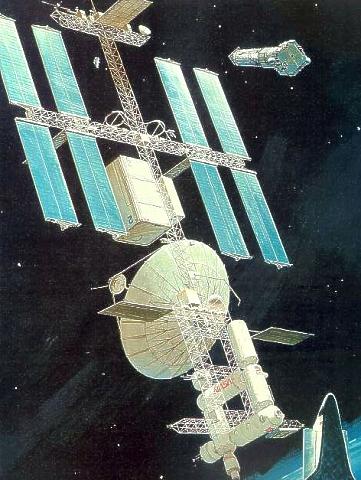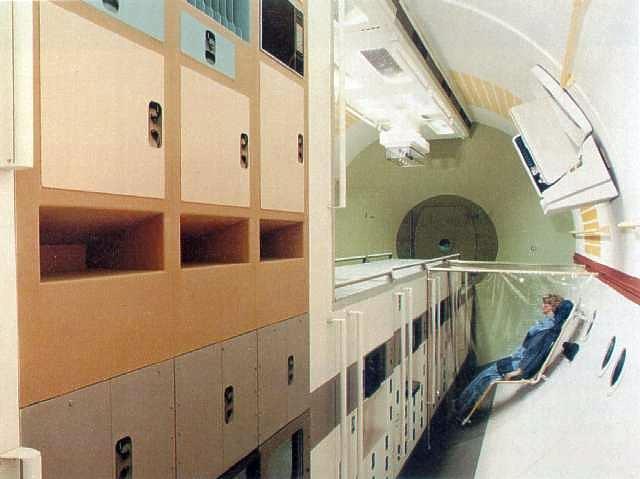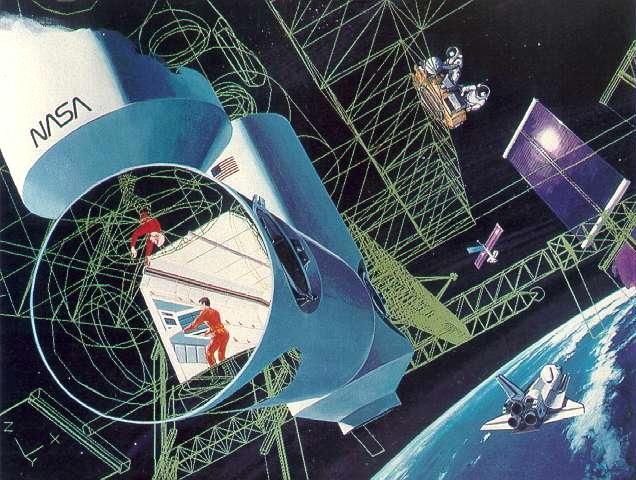Star Voyager
Space Shuttle Refugee
- Joined
- Oct 25, 2008
- Messages
- 1,975
- Reaction score
- 32
- Points
- 48
No we don't  !
!

 !
!
 !
!
Everyone forgets Canada.
the ISS IS a reduced size. This is one of the potential designs back from the early 80's:




IMC Station-1984
This McDonnell-Douglas illustration shows a "Power Tower" Space Station crew module. The original modules were 10.7 meters long with docking ports in both ends. They would have been assembled end-to-end in a racetrack-like configuration. Some engineers felt this could have created dangerous dead-ends inside the Station if a module had to be depressurised.
Credit: NASA via Marcus Lindroos
Ok, improvements in EVA airlock hatches. That's a good development. Never met someone who has ever used an EVA hatch though... :shifty:
It looks even more expensive than the current ISS today..
I will knock research without any applications whatsoever.
And when is it ever obvious what research would be useful?Not really. You get things that are immediately useful, things that are on the fringes of being heavily useful or could have future applications, and then more-or-less pure trivia.
What exactly do you mean by that?The short version: NASA(and its funding govt) is apathy laden, has no direction, and too many PowerPoint spacecraft.
Which is precisely why we need to continue with the ISS, to try and figure out a way to do things cheaper.1-The cost per pound of getting materials to and from the station. Not to mention the small quantities that could be bought back compared to modern industrial volume requirements. Totally uneconomical!
If the ISS has no purpose and doesn't improve our lives, praytell how this is any different.But, again, under *MY* space program, each of the nine planets(don't argue with me on this one either), NINE PLANETS, nine planets and their major moons, would have had 2 orbiters and at least one lander, floater, or flyer; for each body.
And if new technologies that could improve research are invented? Are you not going to want to send new probes and orbiters with these improved research tools? Good luck try to find the funds.Meanwhile, we could stay safely on Earth, accumulating this technology, building a comprehensive knowledge base - advanced energy sources, better management software, better materials, new methods and practices of putting it all together, reliably and repetitively.
And your reasons for this? What's so important about an asteroid that makes it more important than landing on the Moon or Mars?Go?? ?? Go where? That's my point. I believe that with all information we have, it would turn out that the asteroids are the best spot for manned exploration.
Do you honestly think it will take 75 years to have colonies on the Moon or Mars? Please. I'd say within 5 to 10 years we could easily have colonies on the Moon, and colonies on Mars within 20-30 years, but 75 years? That seems a bit long.The case for a manned Mars mission? Or going to the moon again? Would you prefer a one shot mission in 5 years, at great expenditure? Or would you prefer to colonize the place in 75 years? Think about that!







In the disease-ridden first part of 19th century people would have been outraged to find out that instead of being spent on feeding the poor lots of money are spent on looking at tiny things through a set of lenses. Totally useless research... Except that it suddenly discovered germs, and medical death rates dropped dramatically because everyone realized they need to wash their hands between going to a toilet and taking births.
You never know what you'll find - some tiny trivia found by growing chickens in microgravity may suddenly explain how to stop cancer cells from growing, or something quite as good.
each of the nine planets(don't argue with me on this one either), NINE PLANETS, nine planets and their major moons
Which is precisely why we need to continue with the ISS, to try and figure out a way to do things cheaper.
If the ISS has no purpose and doesn't improve our lives, praytell how this is any different.
And your reasons for this? What's so important about an asteroid that makes it more important than landing on the Moon or Mars?
Do you honestly think it will take 75 years to have colonies on the Moon or Mars? Please. I'd say within 5 to 10 years we could easily have colonies on the Moon, and colonies on Mars within 20-30 years, but 75 years? That seems a bit long.
allow us to explore space unencumbered by dragging "ugly-bags-of-water"
Landing on the Moon or Mars is more of a psychological state, a dream, a "because-it-sounds-cool" type of thing. Again, and AGAIN, a Moon and Mars mission is something to be undertaken later, when we can build the correct type of spacecraft. Today, the knowledge does not exist. A lot, A REAL LOT, has been been lost since the Apollo landings.
People can only see so much with their eyes, hear so much with their ears. And in space, there is no sound. So we are really limited to seeing things, in a narrow selection of wavelengths. An unmanned craft can study so much more! Magnetic fields, radiation way outside organic bandwidths, light so faint it takes days to accumulate enough to trip a CCD element. Humans are useless in that type of environment. But the single one advantage is performing maintenance or fixing those sensors that may have broken down. Like the HST servicing missions.
And don't forget the Planetary Protection Program. The EPA of space. What a frakking joke! Basically it says we can't contaminate anything with biological matter, or Microbes! Can you imagine the fit they'd have if a colony dome got a microscopic puncture and all the microbes floating in your fart-gas escaped! HEAVEN FORBID we contaminate Mars with human gut flora! Ohh my!
Forward contamination is a threat not only to science but to future manned exploration. While the chances for a large ALIEN evolving from terrestrial microflora are nil, chances of an unwelcome mutation are not nil. You don't want your crew to fall ill with a deadly cold which no antibiotic would cure.
Infants must learn to crawl before they may walk. ISS, and other space stations make that process possible for humans.
Uh, no. The ISS isn't some visionary platform that drastically reduces costs. In fact, it has got a lot of aspects about it that make it a very costly operation. Being constructed by STS was one of them.
